
Creative Curiosity and Constructive Skepticism in Psychoanalysis:
Written Thought Piece by Stephen Seligman
Scholarly methods and aesthetics may well deserve more of our attention than they are getting these days. Psychoanalytically-oriented practice has much in common with these, as we are adept at in-depth attention with a critical, integrative and perhaps most of all, engaged and affectionate attitude. It’s hard to work analytically if you don’t love your patients, or your work. As empirical research and measurable accountability have become dominant in our larger environments (and can be quite useful), this intersection of the analytic and scholarly styles is worth reviewing and protecting.
I was fortunate recently to receive an award for scholarship from the Society for Psychoanalysis and Psychoanalytic Psychotherapy of The American Psychological Association.
When I was first notified about this, I was aware that the Society had an award for research, but not that there was one for scholarship, so I just assumed that I was getting the research award. This was kind of puzzling, since I don’t exactly do the kind of work that gets called research these days: I don’t run experiments, I don’t have control groups, and I surely don’t have a lab. What I have done – on good days – is read and think as much as I can about whatever subject I’m engaged with. I thought for a minute – quite excitedly (though mistakenly) – that the Division had resurrected the conceptualization of research with which I grew up, going back to elementary school, really: I was reminded of the hours spent in public libraries in 1960’s Brooklyn where I grew up, going from source to source (fascinated, for example, by using microfilm to look at old newspapers), coming home with as many books as I could carry (10 was the limit – I can remember my arms hurting), making index cards for each idea or bit of information, and then arranging and rearranging them to fit some kind of structure that could be organized into some kind of written “research paper.”

Image from unsplash.com
I’ve recently written a book in which I review the varieties of psychoanalytic images of infants and children, contextualized in the history of analysis and its broader cultural surrounds, all before going on to apply infancy research to analytic theory technique. Thanks to that fine award, I’ve come to see a continuity between that work and those junior high school papers, formed through all the influences between then and now: before that I never quite thought of myself as a “scholar” per se. This is partly, I suppose, because I have other commitments in the analytic world – practice, teaching, editing a journal. But perhaps even more central is that there are not many designated roles in the psychoanalytic cultures for scholarship as an identity. I am aware of few jobs or other positions, like fellowships or the like, for psychoanalytic scholarship (unlike every other human science I can think of) – especially in the United States. Moreover, those analysts who do hold university positions usually are typically involved in empirical research, as this is the coin of their realm, as well as of our larger economic environment. When I searched the analytic literature for titles with the word “scholarship,” I found exactly 9, and only 2 of them referred to scholarship in general, while the other 7 referred to some particular area, like “Freud scholarship” or “Jung scholarship.” With rare exceptions, it costs authors money to write a book, in direct expenses and/or in lost clinical time; writing for journals is of course without financial compensation; and, by general consensus, the financial compensation to editors of our leading journals lags behind the minimum wage in the US.
The situation is probably even more skewed in the public mind: it’s possible that lots of educated people don’t even know what scholarship is. Here’s a real example. As I was writing a paper on this, I went down the street for a coffee. I chatted a bit with my neighbor, a successful tech professional, who asked about the paper and the award. He wondered what findings I was presenting, and when I explained that it was for scholarship, rather than research, he asked me what I meant, telling me that he thought of scholarship as when you got some extra money for your education. I had to explain this second meaning.
The psychoanalytic attitude is not the same as empirical ‘researchers’. Psychotherapists are mostly sorting, questioning, and integrating what’s happening around and within us, along with all care and attention. Even when psychotherapists do “test hypotheses,” we don’t use structured experiments, but rather interpretations or other kinds of interventions and varied other things that we try out in our minds.
In addition to that small literature on analytic scholarship, there is some helpful work in other fields that can help us think about how we think. (I’ve just written a paper on this myself. (2020)) Paul Wachtel’s defense of a scholarly attitude in the face of the “empiricization” of academic psychology, offers a good summary of some of those commonalities, adapted just a bit to psychotherapy, which
- involves a talent for synthesis and an eye for contradictions and inconsistencies, often of a subtle or hidden sort. To see not only where “people’s thoughts, feelings and experiences” do not hang together but with what set of changed assumptions and concepts they might “work better” is a challenging task. (p.401)
- The person who is able to identify significant …issues, who can synthesize diverse findings into a coherent conceptual framework, or who is quick to notice ambiguities and …flaws in…<patterns of thinking and feeling> that have been generally accepted is not necessarily the person who can devise an ingenious experimental manipulation… (P.400).
There is a kind of constructive negativity in both analysis and good scholarship. Scholarship involves a critical, curious, ever-questioning attitude about the subject at hand. Even more important in both arenas, though, is the affectionate immersion with that subject, that person. When these come together, something creative and newly generative can happen.
View more in-depth thinking from our guest bloggers on our Thought Pieces page.




